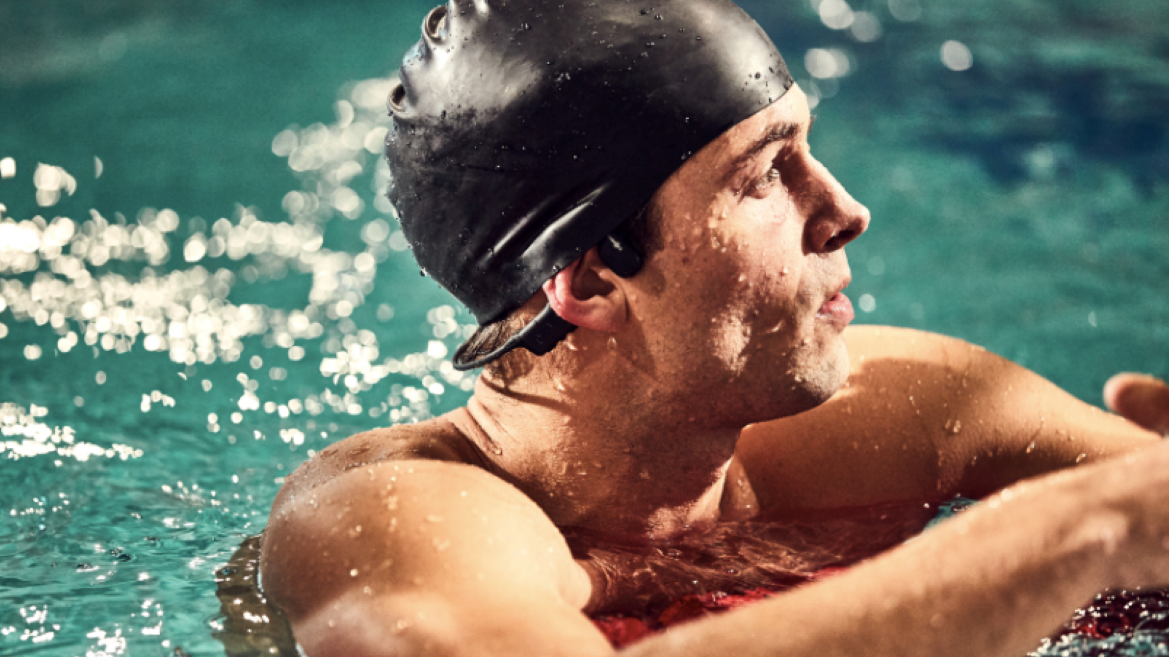
Headphones have come a long way over the years and it’s now possible to buy a pair to match and compliment any music style in a dizzying array of designs. Alongside more regular models, bone conduction headphones are a neat variation on the theme and will be of particular interest if you’re a fan of fitness in the great outdoors. In some scenarios they’re also beneficial for certain types of hearing impediments.
Bone conduction headphones are placed right at the top of your cheekbones so vibrations pass through your jawbone, bypassing your eardrums. Sound is passed directly into the cochlea via the bone, rather than using vibrations moving through the air as is the case with conventional headphone designs.
An obvious benefit is that there’s nothing being pushed into your ear canal, but the real appeal with bone conduction headphones is that you can carry on with your outdoor pursuits while also remaining fully able to hear what’s going on around you. And, as mentioned, the fact the sound waves are passing through the bone instead of through your eardrums can also make conduction phones a potential solution for some people with hearing disabilities. Indeed, early hearing aid designs utilised the technology before headphone manufacturers cottoned on the idea.
Thinking about picking up a set of bone conduction headphones? We've rounded up the best deals on our top models right here.
Comfort levels
Another positive that comes with using bone conduction headphones is that, because they’re mounted on the side of your skull, there’s nothing uncomfortable or intrusive sitting on, or in your ears. Earbuds have become the phones of choice for many folks, but they can be intrusive and not entirely hygienic either as you’ll know if you’ve ever owned a pair. Having to reuse earbuds for long periods of time can become a rather unpleasant experience, even if the sound quality still puts you off dispensing with them.
Similarly, many of us prefer the standard old school headphone design, which sits on your head and over your ears. While this style of headphone remains as popular as ever, the downside to these is that they can be bulky to wear and aren’t always suited to outdoor pursuits. Just the way they can move around if you’re doing anything more than a light jog can become irritating in the extreme.

They also cut out external noise, which is a good thing in many ways, but not so hot if you’re keen to know what’s going on around or behind you. Bone conduction headphones aren’t a perfect solution though and they, like any other headphones can cause fatigue if you wear them for too long.
Get daily insight, inspiration and deals in your inbox
Sign up for breaking news, reviews, opinion, top tech deals, and more.
Even the best headphones you can buy aren’t always going to suit everyone. Bone conduction headphones are no different and ideally need to be tried out first to ensure that you get on with them. Buying headphones is a subjective thing and everyone has differing needs, which is probably why the headphone market is as big as it is.
Staying alert
However, the real advantage of bone conduction headphones, unlike many of the traditional headphones you can buy, is that your ears don’t get disconnected from what is going on around you. In fact, because bone conduction headphones don’t sit on or in your ears, they allow you to hear other sounds. That’s obviously going to be very useful if you’re out and about in the field, but still want to know who or what is near you.
It’s also possible to buy bone conduction headphones that have been specifically tailored to different types of activities. So, alongside the more obvious models for running and outdoor pursuits such as cycling it’s possible to purchase bone conduction waterproof headphones designed with swimming in mind.

It’s important to look closely at the specifications for bone conduction headphones though. While many are sweat resistant, you’ll need to purchase a pair that have been designed specifically for swimming needs to ensure they keep on working once you hit the water.
There are also models that have been created with more of a communications angle in mind, so if you need to make and receive calls on a regular basis when you’re out and about a pair of bone conductive headphones with plenty of talk time capability is worth considering.
Ear friendly
Another bonus of bone conduction headphones is that you have less chance of damaging your hearing. It’s easy to overlook or disregard the harmful effects of playing music too loudly, especially when it’s right next to your eardrums. In fact, like many ills, the negative effects are only noticeable after the damage has been done. Bone conduction headphones lessen the impact on your inner ear, simply because they’re externally mounted.
However, bone conduction headphones can still be problematic for your hearing if you overdo the volume, even though they’re not sitting right in your ears. As is the case with most things it’s a case of everything in moderation, so use your bone conduction headphones reasonably and they should return the favor to your hearing.

A sound choice
Bone conduction headphones do have some drawbacks. Users frequently report that audio quality suffers as a result of not being in or on their ears. It’s a reasonable trade-off though, because any loss of audio quality is compensated by allowing the user to hear other things. If you’re out for a jog and like to keep your wits about you then a pair of bone conduction headphones seem like an obvious item of running kit to consider.
The same can be said if you’re in any other scenario where it’s vital to keep an ear out for any external sounds. Many people like to listen to music while they work, which isn't such a big deal if you’re sat at a desk and working from home. However, if you work in a situation where listing to music is permitted but you still need to be alert for whatever dangers, or managers might be at large, then bone conduction headphones could be worth considering.
Which brings us neatly around to the best bone conduction headphones of 2022 guide we’ve compiled that contains a hand-picked selection of the latest and greatest models you can buy. Unsurprisingly, the Aftershokz brand (or Shokz as they’re now known) is one you’ll frequently hear mentioned in relation to bone conduction headphones. They have a great selection to suit a variety of budgets, but you can also get solid offerings from Vidonn, Tayogo and H20 amongst others.
However, the options are less plentiful than you’ll find in the rest of the burgeoning best headphones marketplace. The same goes for the best wireless headphones and best wireless earbuds too. Nevertheless, for some audio requirements using bone conduction headphones makes perfect sense.
This article is part of TechRadar's Get Fit in 2022 series – a collection of ideas and guides to help get your new year's health goals off to the right start, whatever your current level of fitness.
Rob Clymo has been a tech journalist for more years than he can actually remember, having started out in the wacky world of print magazines before discovering the power of the internet. Since he's been all-digital he has run the Innovation channel during a few years at Microsoft as well as turning out regular news, reviews, features and other content for the likes of TechRadar, TechRadar Pro, Tom's Guide, Fit&Well, Gizmodo, Shortlist, Automotive Interiors World, Automotive Testing Technology International, Future of Transportation and Electric & Hybrid Vehicle Technology International. In the rare moments he's not working he's usually out and about on one of numerous e-bikes in his collection.
